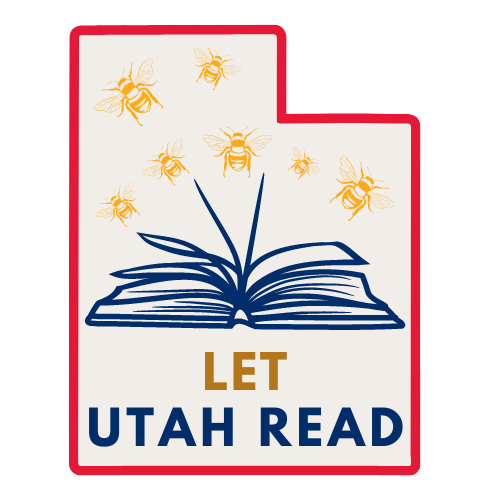Kimberly Johnson Speech at Jan 25, 2023 Read-In
This is the third post in a short series where we’re sharing (with permission!) some of the speeches given at our recent read-in event at the Utah State Capitol.
Today’s speech is from Kimberly Johnson, a poet and a professor of English from Brigham Young University. Thank you for sharing with us, Kimberly!
I’d like to spend a few minutes today talking about the morality of reading. I think that a lot of folks who want to put restrictions on a citizen’s right to read books of their choosing are saying much about morality these days. So it might be useful for us here today to consider reading as an activity with moral consequences. And if we contemplate reading as a moral activity, it becomes even more clear how important it is to protect and to preserve the right to read for all Utahns.
I’m not just talking about the ways that reading benefits society, though the founding fathers would definitely back me up on that point: Thomas Jefferson wrote that “Information is the currency of democracy” because of his conviction that an informed and widely educated electorate is best equipped to deal with the complex problems that arise in any society. While Jefferson connects reading to civic morality, I want to talk today about reading’s relationship to, for lack of a better word, religious morality. For obvious reasons, I’m dearly hoping to have the ears of our good legislators here. And to help make that point, I’m going to enlist the help of 17th-century poet and theologian John Milton.
If you’ve spent much time with Milton’s work, you’ve probably read Paradise Lost. But nearly two decades before he wrote that great epic poem, Milton found himself frustrated by Parliament’s desire to ban a bunch of books in England. So he wrote a defense of reading, in which he explained why book bans—far from creating a moral society—actually prevent people and societies from developing morality. He refers to the teachings of the Apostle Paul when he argues that people have been given minds from God in order to develop judgement. Milton writes, “Read any books what ever come to thy hands, for thou art sufficient both to judge aright, and to examine each matter.” Indeed, for Milton, reading widely and variously allows us to be exposed to a range of ideas, so that we can exercise true agency.
Milton identifies the development of our agency as a central spiritual value, and he finds evidence of the importance of developing moral agency in other scriptural texts as well. Milton looks particularly at the creation narrative of the book of Genesis, noting that God gave Adam and Eve reason, which carries the responsibility to take in information and to make choices based on that information; had it been otherwise, he writes, Adam and Eve wouldn’t have been able to become fully formed moral actors but would have instead been mere puppets. And if God wants humans to make real moral choices, and become actual moral agents, books are—Milton says—the best possible means.
Concerning book-banning, he says, “Why should we affect a rigour contrary to the manner of God and of nature, by abridging or scanting those means, which books freely permitted are, both to the triall of vertue and the exercise of truth.” In other words, books freely read give us the opportunity to engage a world of ideas, and to decide for ourselves what we think of them. That, concludes Milton, is real morality: using reason and information to make choices. Closing ourselves off to ideas doesn’t produce virtuousness, it makes us morally shallow and immature.
Here’s one final quote from Milton on the matter: “I cannot praise a fugitive and cloister'd virtue… unexercis'd & unbreath'd.”
If, as Milton argues, the censorship of books limits the development of our moral capacity, it also prevents us from seeing the image of God in our neighbor, prevents us from learning from perspectives not our own. By allowing us to imagine and to understand the lives of others, reading helps us develop empathy, which allows us to better mourn with those who mourn, and to better understand how we might comfort those who stand in need of comfort.
I think about how deeply my younger son was affected by the horrifying legacies of slavery when he read Toni Morrison’s Beloved—he of course knew the history, but Morrison’s storytelling allowed him to feel the human costs of what before had been mere information. I think about my older son’s powerful experience reading Art Spigelman’s graphic novel Maus, which both helped him to feel connected to oppressed members of his community and got him thinking about the ethics of telling stories about other people’s trauma. Empathy and ethics: these are lessons my kids have learned from reading—and in these two particular cases, from reading books that have recently been challenged or banned in parts of the United States.
I am so grateful to all the teachers and librarians—at school and in the city and county library systems—who helped to encourage my boys’ interest in reading “any books what ever came into [their] hands,” who got to know my kids personally, recommending new reading based on what my kids loved on and off the page and making lifelong readers of them both. These people of the book, along with many, many, many authors, have been my partners in raising kids who are informed citizens, thoughtful and compassionate humans, and fully-formed moral agents.
Let my kids read. Let all kids read. Let all people read. Let Utah read.

